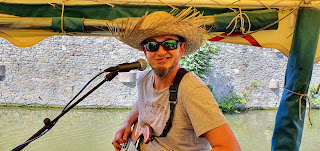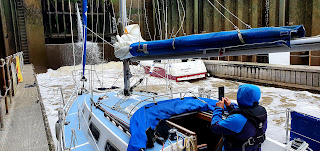It was a good weekend. They usually are as I'm not generally one to sit around idle if I have any choice, but this was a fun one.
On Friday evening there was an "Open Mic Night" at my daughter's pub in Cheltenham, so Dad, Nikki and I went along to support that, with the intention of carrying on down to the boat in Portishead when we were done. I volunteered to take my turn as driver; my slot at the open mic wasn't until 2330, so I figured that was my best chance of staying sober enough to still give a credible performance.
Not that I can't give a credible enough performance with a beer or two in me, but I've done that the last couple of times, so felt this time I it was definitely my turn to let the others have a drink, especially as it would make for such a late night.
Weather forecast was very light for Saturday, but livening up, backing to the south and bringing rain for Sunday. Spring tides meant low water was early afternoon, perfect for a weekend trip to Cardiff and back with Nikki and Dad. With an average of about 4 knots forecast for Saturday, I figured the passage down would be mostly under engine, but with the forecast increasing to 14 knots the following day, we anticipated the sail home would be good, regardless of the promised rain.
Saturday 10th July : Portishead to Cardiff
(20.4 miles, 4 hours 54 minutes underway)
Despite the late night Friday evening, we were up bright and fresh Saturday morning. Despite the forecast not mentioning it, the morning was accompanied by a light drizzle as we prepared the boat to cast off.
We had an outbound lock booked for 1000, but we were ready to go not much later than 0900. A little after 0930 I could see three green lights on the lock gate at the far end of the marina. I called the lock up on the radio to ask if that was for us. They explained the 0930 was running very late, but suggested that if we were ready then we were welcome to join that one instead.
So we cast off at 0940, joined the lock, and by 1000 we were out and following the couple of other yachts that had locked out with us down channel, being carried by the ebb tide and cooled by the continuing drizzle. The sea was calm, with just the faintest whisper of apparent wind straight onto our bow.
By 1025, passing Welsh Hook, the wind had increased a little and our course had veered enough to starboard for the wind to now be coming in over our port bow. We speculatively hauled out the sails and killed the engine. With 8 knots of apparent wind, the canvas filled and the little yacht continued to burble gently along close hauled to port, making 7 knots over the ground with the fair tide under her.
The drizzle persisted, but the day was warm so it almost seemed to evaporate almost as quickly as it settled on you.
Over the next hour and a half we continued on our way, the wind F2 to F3 at best, but our course bearing away onto a close reach as we cleared the confines of the Bristol Deep. The drizzle finally gave up and the sky began to carry the meerest tease of blue.
Twice we had to tack to avoid collision with one of the prolific navigation buoys; on the Bristol Channel these things are usually the size of a small tug and have their own bow wave. On a close reach we could theoretically have born away, but in each case I didn't have enough confidence in the wind to try and pass up-tide of either and didn't relish the thought of one of them tee-boning us.
Around 1300 we were approaching North Cardiff. We cut in close over the shallows of the spoil grounds. The sea was flat, we were early on the tide and it wasn't a big one as far as springs go; even the low water of 1.8m would've been enough to have seen us over the shallows, and that was still an hour off.
Passing astern of one of the Bristol Channel's
resident dredgers "Orca", at anchor in the Roads, we dropped our sails and started the engine off the foreshore of Penarth. Picking our way down the Wrack Channel so late on the tide was a little nerve wracking, absolutely no pun intended. For most of the way down the main channel, we were sounding less than 0.5m under our keel. Once we got into the short cut that led off the channel and into the outer harbour, we stopped looking and just picked our way very tentatively down the centre of the channel.
Barrage Control held the lock for us for a few minutes extra, and by 1333 we were alongside lock #2 and lifting into Cardiff Bay with a small powerboat for company. They light heartedly remarked at how "bottom clenchingly" shallow they'd found the low water approach to the lock themselves.
Instead of heading straight into Penarth where we had our berth for the night booked, we made our way over to the visitor pontoons in Mermaid Quay and spent the afternoon there where we found a very nice Italian restaurant called
Bellini's and we enjoyed a late lunch / early supper with a couple of beers and a very fine view of the bay.
Dad had the Pollo alla Crema and proclaimed it was the best meal out he'd had in an absolute age. So they obviously got the portion sizes right. Nik had the risoto and I had Spaghetti alla Marinara. And it was delicious. We shall certainly be back.
The trip back across the bay to Penarth was completely uneventful. A mile and a half under engine, beneath a warm sky and the usual warm welcome of Penarth Marina at the end of it.
Sunday 11th July : Penarth to Portishead
(19.3 miles, 6 hours 20 minutes underway)
Cardiff low water wasn't predicted until 1440 Sunday afternoon, high water Portishead 2115, the first lock opening at 1730. The morning was sunny, but heavy rain was predicted for later in the afternoon, wind forecast to be in the south at up to 15 knots.
We had a very acceptable breakfast on the patio of a cafe called
The Galley overlooking the marina. I'd normally lock out an hour or two after low water to head back up to Penarth, but with a stiff wind in the south and the promise of a drenching later in the afternoon, we decided to leave early, head out south around the sand banks of Cardiff Grounds and then punch our way back up channel to make what headway we could against the last of the foul tide.
So we cast off at 1200. The prop walk to port on the Westerly can be a bit of a handful sometimes, and having left our berth, our progress astern down the fairway between the pontoons to where Dad had intended to turn the boat in the main channel was suddenly impeded by a gaggle of paddle-boarders.
As the way fell off and the rudder lost authority, there was a brief moment of nerves as we found ourselves being blown onto the boats berthed to leeward, but Dad rescued it, turning the boat around within the confines of the space available with a combination of nudges ahead to starboard and gentle walks astern to port with the prop.
Leaving the marina we called up Barrage Control and were allocated a space in lock #2 again for the 1230 lockout. We had the lock to ourselves and it was a long, long drop down to the outer harbour.
By 1250 we were in the Penarth Roads in a brisk wind, sails up and the engine off. Close hauled with the first reef in the main and a roll and a half in the headsail, we tacked off to starboard once clear of the outer banks of the wrack and beat a course out to the southern tip of the outer sandbanks of Cardiff Grounds.
The sea was short and choppy but no more than a meter and the wind enthusiastic, drawing some grim frowns from my wife as the little boat heeled over to 20° or so and bashed her way through the chop. Dad was uttering words to the effect that I just couldn't help myself and didn't I realised he was trying to tidy up down below, with Nik muttering "It's the racer in him" as if the lively weather and the need to beat south before we could turn north were somehow all my fault.
Although I confess, I was enjoying myself.
By 1326 we turned around the southern end of the Cardiff Grounds sandbank, bearing away towards the Monkstone and straight into the throat of a still very foul tide. Set on a beam reach, our speed fell away to just a little over 3 knots, suggesting we were carrying more than a respectable 5 knots actually through the water.
On the other side of the channel I could see half a dozen yachts close together beating hard down channel towards the Holms, a small racing fleet from Portishead Cruising Club.
The South Cardiff lateral passed a couple of cables to port. Holding a steady course was quite tricky, as the slightest adjustment of a couple of degrees would put the tide hard onto one side of the bow or the other, pushing our actual course over the ground more than twenty degrees in one direction or another for just a couple of points tweaked on the autohelm.
By 1405 were passing the east cardinal marker called Hope. Our progress past felt painfully slow. The wind was gusty and the sea choppy and confused, needing a careful eye kept on the course in case an unanticipated shift or eddy sent us ferry gliding into the navigation mark. With all this open sea out here you'd think they'd be easy to miss, but they seem to attract fibreglass in the same way a magnet sucks up iron filings.
1511 and the tide was just beginning to ease. We were west of the shallows of the English Grounds, approaching North Elbow. The sea had calmed as the tide turned with the wind, but the rain had caught us, enfolding us in its murky, sodden embrace as it rolled its course up channel.
1607, and despite the wind easing, we were now making 4.2 knots over the ground as we closed on the Avon buoy, a starboard lateral off the shores of Clevedon that marks the start of the King Road shipping channel that leads up to Avonmouth and Royal Portbury Dock. For the last hour, the rain had come down in an absolute deluge, but now it was beginning to ease a little.
Out from the slowly brightening gloom astern we could see four or five dark sails slowly catching us up, the racing fleet on their return to Portishead, and potential competition for the first lock when they inevitably beat us back.
By 1639 the wind had lightened considerably, although the light rain persisted. The tide was now running hard in our favour, we were making 7 knots over the ground despite being under-canvassed in the failing air as we made our way along the Portishead shore and past Black Noir Point. I shook the reefs out of the sails.
At 1710, standing into the back eddy off the breakwater outside Portishead, we lowered our sails and started the engine, calling up the marina to request a lock in and being cheerfully invited to await our turn. Four of the racing yachts were clustered together off the end of the breakwater, crowding the gap between it and the muddy spit that was the entrance to the shelter of Portishead Hole. My guess is that one of them had tried to enter, but had grounded in the mud.
As she lifted off and the clutch of them moved away from the entrance, we slipped in. Ahead we could see the lock gates opening. The marina called us up on the VHF to ask our draught; they claimed they had a meter over the cill, and when we confirmed we drew just less than that, they invited us to try out luck and enter if we fancied our chances, and promised to take it very, very gently.
So we headed in. We could feel the soft mud sucking at our keels on the initial approach, but once we out of the Hole and into the throat of the outer lock channel, the mud released us and we tentatively pushed our way past the maw of the gates without mishap. We put alongside the starboard pontoon at the far end, nestled up to the massive, weeping edifice of the inner gate, leaving the deeper port side to the bigger boats, once they were eventually able to join us.
Over the next half an hour as the tide slowly rose, they managed to fit five of the six racers in along with a couple of fishing boats; eight of us in total crammed into the close confines of the lock.
When the sluices opened, the water rushed in as usual in an absolute torrent. One of our fenders threatened to pop up, so I put what weight on it I could to stop it popping out completely and Dad handed me a spare from our offside to push down into the gap in support; however the lock keeper, attentive as ever, saw my struggle and eased the flow briefly to let me push the fender back home. Checked we were alright over the radio, and receiving a thumbs up from me, they re-released the deluge.
At 1820 we put Calstar in uneventfully alongside her home berth, our journey over, and the only thing left to do to was unship our overnight bags into my waiting car, make her tidy and secure, and head home.
The rain continued, unrelenting.









































